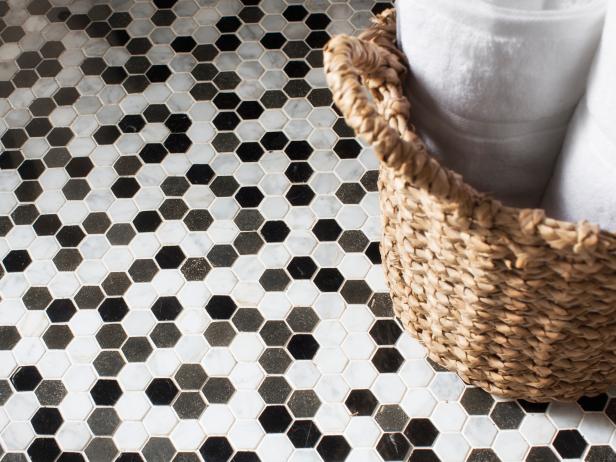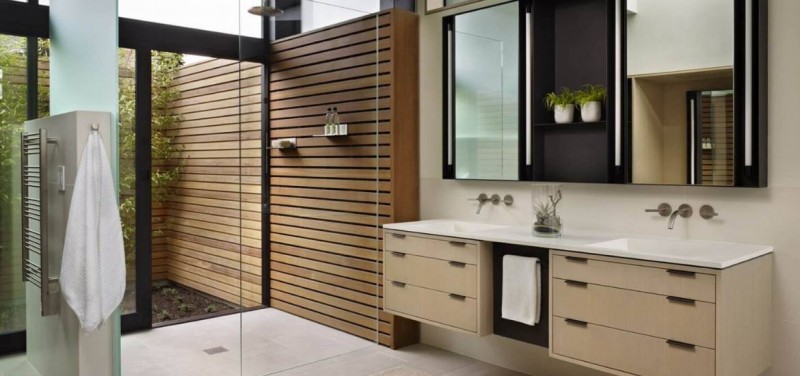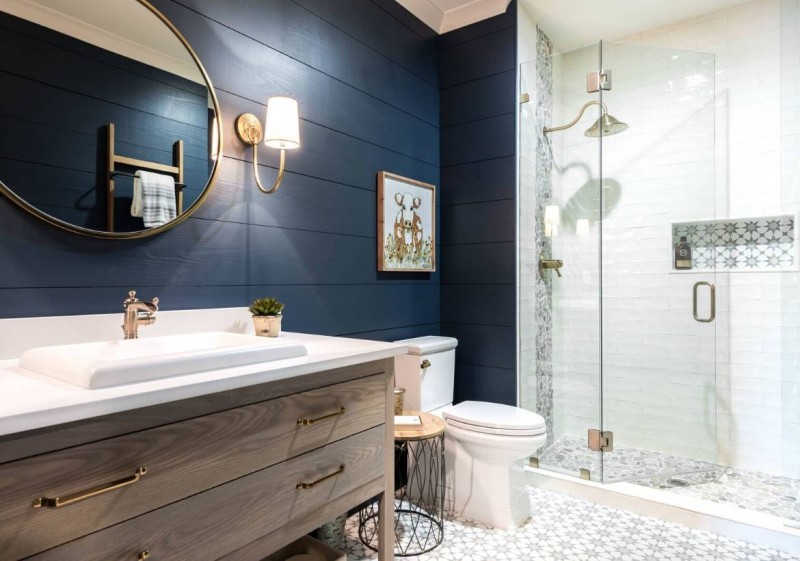Picking Materials for a Bath Remodel
Before you shop for vanities and choose the material for your countertops, make sure you have a well-thought-out plan for your bathroom renovation. You should identify goals and priorities, with the help of your completed Day in the Life of Your Bathroom Questionnaire and Bathroom Goals Worksheet. You also should have a clear vision of what your new bathroom will look like, after exploring various bathroom designs and layouts.
Now it’s time to drill down to the details of your bathroom remodel. It’s best to choose all of the fixtures, materials and finishes down to the hardware before the project begins. That way, you will have a truly realistic idea of how much the project will cost.(Allowances can quickly get out of hand.)
As you choose among fixtures and materials, visit specialty design showrooms for plumbing, lighting, flooring, cabinets, etc. You’ll get a real feel for what’s available in the market, and you can talk to the professionals who work there about your ideas and what products will achieve your goals.
Choosing Bathroom Flooring
Tile is the surface of choice in the bathroom—natural stone or porcelains and ceramic that mimic natural stone. Floor tile is larger—12×12 or 18×18 inches—and color schemes are neutral. “Rather than putting a lot of color on the floor and drawing your eye down, we’re incorporating subtle designs to complement the room,” says Rick Miller, president, Miller’s Fancy Bath & Kitchen, Louisville, Ky. In general, Miller likes to keep contrast at countertop level, at the sight line.
Ceramic tile floors are designed with more texture than ceramic wall tile to prevent slippage. Honed natural stone will also provide traction when floors get wet—that’s when the surface is ground flat but not polished. Natural stone also can be sandblasted.

Choosing a Contractor for a Bathroom Remodel
Ask for Referrals
Word of mouth — hands down, it’s the best way to find a qualified professional to tackle the job. Ask relatives, friends and neighbors whom they have had good experiences with. Also ask what made it a positive experience, how the contractor handled problems and whether he or she would use the same contractor again.
Look at Credentials
With recommendations in hand, do some preliminary research, whether that’s with a phone call or a visit to the contractor’s website. Find out whether he or she holds all the required licenses from the state and local municipalities, as well as designations from any professional associations like the National Kitchen & Bath Association (NKBA), the National Association of the Remodeling Industry (NARI) or the National Association of Homebuilders (NAHB). Look for contractors who have invested in coursework and passed rigorous tests in order to earn a particular certification. Be aware, however, that all certifications are not created equal. “I would find out what the certification is and what it took to get it,” says Sara Ann Busby, NKBA president-elect and owner of Sara Busby Designs in Elk Rapids, Mich.
Interview Candidates
Narrow down the list of contenders, and set up meetings. What is the magic number of contractors to interview? “Ultimately, the right amount could be one,” says Al Pattison, past president of NKBA, but he recommends talking with no more than three. “With too many quotes, it gets too confusing trying to make a decision.” NARI offers a list of questions to ask potential contractors on its website.
Check References
Once rapport has been established, ask to see some of the contractor’s projects. If they meet with approval, request references and then actually call the contractor’s former customers to check up on them. Ask how the contractor did at executing the project. Was it on-time and on-budget? Were they pleased with the outcome? Was there anything that could have been done differently?
Get it in Writing
After zeroing in on one contractor who seems right for the job, take a look at the documents he or she has prepared. Do they look professional? Scrutinize the contract. Does it seem fair and balanced?

Tips for Hiring a Bathroom Remodeling Contractor
Remodeling a bathroom can be one of the most satisfying home improvement projects of all. Results are immediate and personal—a sparkling new shower or bathtub, a cheerful paint scheme, a bathroom vanity with a beautiful countertop, and more storage than ever. A high-quality bathroom remodel can also pay you back by boosting resale value. One way to ensure the best bathroom remodel is to hire a bathroom contractor with experience who can see your project through to its successful completion.
Interview Three or More Bathroom Contractors
When you speak to just one or two bathroom contractors, you gain only a limited set of viewpoints. If you go ahead and solicit bids from these contractors, the bids might be higher than expected. By increasing the number of contractors that you interview, it is easier to find the contractor who is the perfect fit for your job. Plus, you’ll have a greater range of bids to choose from.
Review the Contractor’s Previous Work
Bathroom contractors typically show up for the interview with a picture gallery of the previous bathroom remodels, either in a picture book or on a screen. You can also view the contractor’s portfolio on their website or on contractor-matching sites that they belong to. Aim to look past the pretty pictures and decide if this bathroom contractor does the type of work that is right for you.
Get Estimates in Writing
Verbal estimates are worth little—for either the homeowner or the bathroom contractor. Numbers get forgotten or misinterpreted or misheard, even if everyone has good intentions. Well-written estimates are understood by all. It is perfectly fine to ask a bathroom contractor for a verbal ballpark figure. Just understand that no one is being held to that figure, and that you should follow up with a written estimate of costs.
Pin Down the Schedule
Before signing the contract, be sure to clarify with the bathroom contractor the date that the remodel can start and the overall duration of the project. Scheduling matters both to you and to the contractor. When both of you are in agreement, then you can proceed with the contract. “Time is of the essence” is a familiar contract clause that defines the amount of time the contractor has to work on the project, along with a payment schedule by the homeowner.

MUST-KNOW BATHROOM REMODELING TIPS
Getting ready to start a new bathroom remodeling project? Is this your first time going through a home renovation? It’s an exciting chapter of your life and one that should be approached the right way. We compiled our favorite tips and tricks to help you learn the perfect balance between your creative customization needs and functional design ideas that can help you tie the whole bathroom together.
We all want a bathroom that would be a reflection of our personal style and be able to deliver the comfort we need at the same time. However, aside from that, it’s also important that it has the right fixtures and amenities that are capable of providing function and value as well. Fortunately, through careful planning, finding the right contractors, and choosing the right design, you can have it all. Here are some of the best tips that could turn your bathroom remodeling dream into reality.
PLAN YOUR BATHROOM
Before you even call a remodeling company for your bathroom remodel, you should first talk with everyone who will be using the space. Try to have a discussion about the fixtures and finishes you are supposed to use and how much of a budget you’re willing to shell out. As you plan for your budget, it’s important to have a little extra, because you never know if there will be some unexpected problems that will increase the cost later on.
This planning would be very helpful and go a long way toward keeping with your bathroom renovation plan as you move along with the project. Once you start with the renovation, you have to know that the process could take around 30-90 days. No matter how long it is going to take, try to resist the temptation of changing your plans unless financial constraints or problems arise. Changing your plans can create more hidden expenses by delaying contractors, ordering new items, and pushing your end date out further and further
How to Design Your Bathroom?
A lot of homes usually have at least one bathroom with a sink, toilet, and bathtub. Then, there are optional extras, such as the shower, and in some cases, a bidet. An extra sink is also a popular choice for most people, especially in households where the bathroom is often used by more than one person. A master bathroom should especially take into consideration the space required for two sinks, two vanities, and even two medicine cabinets

How To Choose a Bathroom Remodeling Contractor
What is the biggest mistake people make when choosing a contractor? Is the old saying is really true, you get what you pay for?! We see this so often in the home remodeling business. If you want quality construction, it’s important to learn how to choose a bathroom remodeling contractor because of the value you will receive, not simply because they have provided the lowest bid. It is impossible for any company in any industry to offer the cheapest price, have the highest quality, and provide the best service all at the same time. You can get high quality and superior service, but rarely will you get both and still get the lowest price. Keep reading to learn a few of the keys about how to choose a bathroom remodeling contractor
Quality
A contractor who always offers the lowest price tends to also offer the lowest quality. You’ve worked too hard and spent too much money on your home. Why throw it away for the few pennies you might save on a contractor? The result could be lower quality materials and or lower quality of service and expertise because of their cheaper price. This often costs you more money and is a false sense of savings
Service
Cheaper contractors can’t and don’t usually stand behind their work if there is a mistake. Sure, other home improvement contractors might do the same project for a little less money, but how will they treat you when there is a mistake? To give you the cheapest price, they usually have inexperienced, lower-wage employees that are not been adequately trained and cannot provide the best craftsmanship of their specific trade.